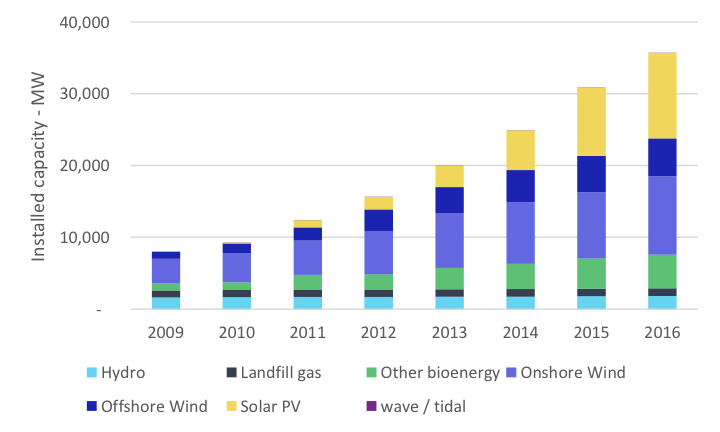There is a significant engineering skills shortage in the UK, particularly in the renewables sector. In 2017, renewables accounted for 29% of total energy generation, with 14.6% from wind. In fact, we generate more energy from offshore wind than any other country in Europe. But despite having massively increased our renewable capacity over the last ten years, we’ve yet to match that growth in expertise.

The UK’s explosive growth in renewable capacity
(source data from the Department for Business, Energy & Industrial Strategy)
An urgent need for talent
Annually, the UK is short of 20,000 engineers, and, embarrassingly, we have the lowest percentage of female engineers in Europe.
According to a report by the Global World Talent Index (GETI), the renewables industry is slowly starting to wake up to the problem. Four out of five hiring managers believe a skills shortage is constraining progress.
But there is an answer. By helping students see the potential of a career in renewable energy, we could solve two problems at once. We could offer people rewarding careers while also filling the industry’s skills and gender gap.
How companies like Octopus can help shape renewable energy careers
Industry initiatives have tried to engage students and highlight the benefits of renewable energy careers.The BEIS-supported ourfuture.energy from RenewableUK is one such example. Unfortunately though, engagement between schools and students has sometimes fallen short – perhaps because teachers are still relatively unfamiliar with this fast-growing industry.
An easy way around this is to invite employers like Octopus into schools to give careers advice. Not only do we have the knowledge, but we also have an interest in sharing this knowledge with future talent that might be interested in a career the renewables sector.
Employer involvement in careers guidance offers a number of huge advantages. Not only does it increase students’ future earning potential, but also smoothes their transition from secondary education, increases their job options, and tailors career paths to student aptitudes (not just university but apprenticeships, too).
Roy Horobin, History Teacher at Bridlington School in Yorkshire, saw the value industry role models could offer over returning alumni. As one of the best-performing schools in a deprived area, Roy believed that meeting professionals would help students break that cycle of deprivation by learning what real jobs were like.
So, in July 2017, Roy organised a Careers Day for students who were in between studying for GCSEs and ‘A’ Levels, and brought in representatives from many different industries – including Octopus.
Explaining the renewable energy career path
The Octopus Energy Investments team already has a close connection to Bridlington. We fund and manage Fraisthorpe wind farm, located just five miles away from the school. With nine turbines and a total capacity of 29.7MW, this is one of the many wind farms that generate power on behalf of our Octopus Energy customers. Margaux Delahaie, who manages Fraisthorpe, went to talk to the students about a career in renewable energy.
In small groups organised by their favourite subjects, students visited each industry representative for around half an hour. Margaux spoke to four groups of students, and was struck by their enthusiasm and desire to know the subjects, qualifications, and skills needed for a career in renewable energy.
Margaux explained the different paths for engineers and technicians, and non-technical careers in supply chain, finance, and law. She also outlined the jobs needed at different stages of renewable energy development, such as planning, construction, installation, operations, and maintenance. Importantly, Margaux’s presence made it clear that careers in the renewable energy industry are not just for the boys.
Roy said of the day: “Margaux attended our Careers Day and was brilliant. Our students come from a deprived area and it’s great for them to meet dynamic people like Margaux. She is a great role model for our girls to engage in Science, Technology, Engineering and Mathematics (STEM) subjects. Margaux also helped the students develop their social skills by giving them practice talking to an adult who isn’t a teacher. She also gave them detailed information on careers in the renewable sector.”
Challenging perceptions
As well as being a role model, Margaux helped demystify renewable energy for the next generation of talent. Despite Fraisthorpe’s close proximity, not many of the students understood how wind farms operated, or the amount of expertise needed to install and maintain them.
This isn’t unusual. The renewable energy industry is still seen as relatively new and not widely understood. But it does mean that young people are missing out on the chance to upskill themselves for jobs that are very much in demand. Jobs that are rewarding, varied, and crucial to the security, availability, and sustainability of energy in the UK. Jobs for young people in communities like Bridlington. Maybe even at their local wind farm.
Roy has already invited us to the next Careers Day at Bridlington School. We hope to again prove that a career in renewable energy is worth pursuing.


